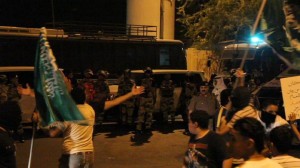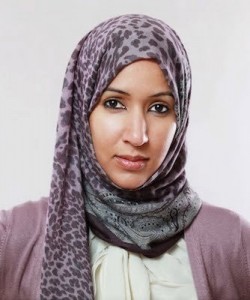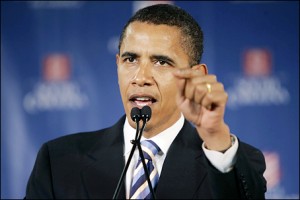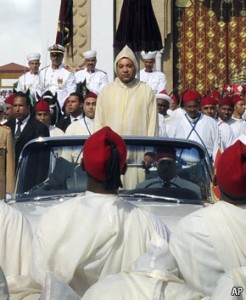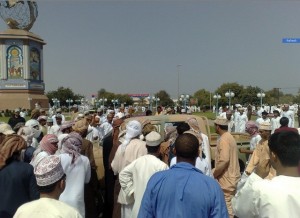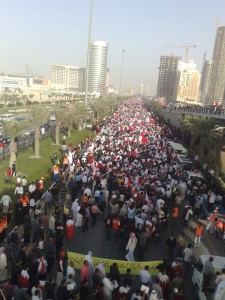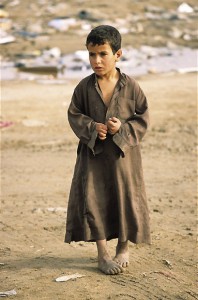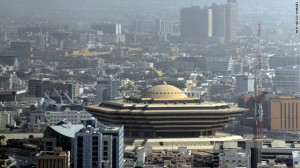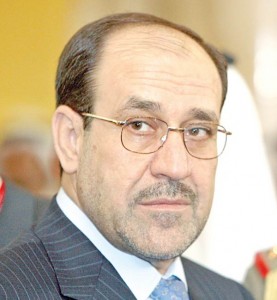The young people here stopped protesting last week, effectively ending the first chapter of the so-called Arab spring in the oil-rich Kingdom of Saudi Arabia.
The protesters of Qatif abandoned demonstrations after weeks of unrelenting pressure not only from the government—which arrested at least 150 of them without charges—but also from their own community elders.
Few activists, who seek more say in their government and an end to sectarian discrimination, have given up on their demands. They say they’ll be back, confident that time and global trends are on their side.
Protesters in Qatif last month carried a mock coffin and pictures of men said to be held without trial.
“Historical changes are going on. We are a part of this,” said a 25-year-old protester. “We’ve decided it’s our time.”
Qatif isn’t representative of Saudi Arabia, where there have been no other Arab spring street protests. But its corner of the country, in the Eastern province, where nearly all of the kingdom’s vast oil fields are located, is critical to the Saudi economy and world oil markets.
The city’s roughly 400,000 residents are almost all Shiite Muslims, a group that makes up perhaps 10% of the kingdom’s mostly Sunni Muslim population.
Qatif, as well as surrounding areas home to substantial populations of Shiites, has long had a prickly relationship with the government. Periods of protest and crackdown have punctuated the past three decades, and deep suspicions cloud the community’s interactions with the government and the majority Sunni population.
Shiites in the area complain of discrimination in jobs and education and restrictions on their freedom to practice their religion, which differs in significant ways from the purist strain of the Sunni faith officially endorsed by the government.
Meanwhile, the government worries that Shiites could link up with co-religionists in Iran to cause problems in the kingdom—fears community leaders in the area insist are exaggerated.
But plans announced in February by King Abdullah, the octogenarian ruler, to spend more than $100 billion for state security, the conservative clerical establishment, salaries of public-sector employees and handouts to other groups could be a sign of concern that Shiites in Qatif weren’t the only ones asking more from their government.
The spirit of the Arab spring has also led to a renewed effort by women organizing to win the right to drive. Though those behind the effort have been careful to protest only online or by driving alone, not in groups, one Saudi woman was arrested this week for getting behind the wheel and posting a video of it on Facebook.
In Qatif, small protests started in late February, about a week after Egypt’s president resigned. In nearby Bahrain, street demonstrations were already drawing tens of thousands into the streets, most of them Shiites seeking better representation and treatment from their Sunni-dominated ruling family.
In early March, one protest in Qatif drew several thousand people, and a concerned Saudi government began to take action.
Local police arrested 28 protesters. Prince Muhammed bin Fahd, the governor of the Eastern province, initiated a flurry of meetings with secular and religious elders, pressing them to stop young people from protesting, community leaders who attended the meetings said.
The deputy governor met with about a dozen youths, who presented him with a list of demands for equal treatment of Shiites and more participation on governmental decisions. Officials from the provincial government declined requests to comment.
But those who attended the meetings said the government priority was on stopping the protests immediately, as some social-networking sites were calling for a kingdomwide protest the following week.
In a gesture apparently calculated to build some goodwill in the community while also removing yet another reason to protest, the provincial government released the 28 protesters who had been detained. “They’ve tried to relieve some of the pressure,” said Jafar al Shayeb, an activist who heads Qatif’s municipal council.
Protests occurred anyway, with several hundred mostly young people taking to the streets on the designated protest day,March 11.
There were more meetings, which put more pressure on local elders. Some of them had been confrontational activists themselves, but nearly all had long ago decided to work with the Saudi government rather than confront it directly.
On April 22, about three dozen local clerics reluctantly signed a statement asking the young people in the community to stop protesting.
Young protesters were angry. Hundreds ignored the request and demonstrated the next week anyway. Police beat and arrested some at the scene, people who attended the protest said.
The activists debated among themselves for another three weeks, protesting sporadically and in small numbers, before a group of informal representatives issued a final set of complaints and agreed to stop demonstrating. But they describe their halt to protests as a pause, rather than the conclusion of anything. More than 120 protesters remain in government custody.
“The government says we are not ready for change,” said a 26-year-old writer. “We are ready. We are more than ready.”
By BILL SPINDLE



